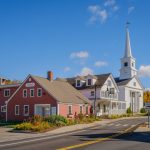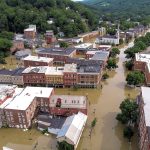The Northern Pass Project | ‘My Roots Are Deeper than Your Pockets’
Would you have chosen integrity over money when the Northern Pass Project came to town? These New Englanders did, proving that love of place can run so deep that it’s like faith.

Coffee By Design | Portland, Maine
Photo Credit : Katherine KeenanLynne Placey is a 66-year-old widow who loves teaching piano in her small house in Stewartstown, New Hampshire. She gives lessons on her mother’s instrument, which was made the year her mother was born, 1920. “I’ve enjoyed every minute of what I’ve done for 30 years,” Lynne says. “People say, ‘How do you listen to all those sour notes?’ [I reply,] ‘Because I know what’s coming. I can see down the road.'” She feels “very blessed” to teach piano.
Lynne used to have about 45 students a week. She was able to just get by on that, but lately the number of students has dwindled to about 18 a week. They’re too busy playing soccer, and not every home has a piano anymore. She doesn’t have any other income, except for Social Security. Her late husband, Donald, was ill for more than 10 years, confined to a hospital bed in their living room. Lynne would look after him between lessons. Then she broke her back, and two months later, on October 8, 2009, her husband died. Like many people, she didn’t have health insurance, and the long illness had wiped out their small savings.
A year later, her nephew Landon Placey came by to tell her how she could make a half-million dollars, just as he had done; her money worries would be over. He asked her not to tell anyone else about his visit; this was just between them. Landon had sold his property, 114 acres, to a utilities group, Northern Pass Transmission LLC, that wanted to build big high-voltage transmission towers across his land. He was one of the first to sell, and the contract he’d signed required him to secretly offer her the same opportunity, he said. Lynne’s husband had left her 78 acres on Holden Hill, about nine miles from her home. Her land was right next to her nephew’s, and it was in the path of the proposed power lines. Landon stayed quite a while trying to convince her to sell. Lynne told him what she’d told a real-estate agent who had called a month earlier: “I’ll listen to what you have to say, but I’m not selling.”
The Northern Pass is a $1.1 billion joint venture of Hydro-Quebec and Northeast Utilities (parent company of Public Service of New Hampshire), aiming to build a 180-mile transmission line through the Granite State. To do that, they want to cut 40 new miles of right-of-way to accommodate towers as tall as 80 to 140 feet. Since it was announced in October 2010, the project has angered and divided residents of the North Country.
On one of their first dates, Donald took Lynne to see his land on Holden Hill. “I think he was trying to impress me,” she says. Donald was one of eight children who had inherited land from his father, Guy Placey Sr., once the largest landowner in Stewartstown. Donald was proud of that land; he hunted and fished there. Later, they took their three small girls there for cookouts, and he’d take each daughter off by herself and teach her to fish.
“It was a beautiful piece of land,” Lynne says. “I grew to have a love for it like my husband’s.” There are good views in three directions: southeast to The Balsams’ ski area, southwest to Vermont’s Monadnock Mountain, and north to Pittsburg. And there’s a 35-acre field that was hayed up until 25 years ago. Lynne would like to bring that field back.
Shortly after her nephew’s visit, Lynne wrote a letter to local newspapers telling about her “secret” conversation: “Can you imagine what half a million dollars would do for me? I won’t tell you I didn’t give some thought to all that money. The gold-plated carrot was dangled in my face. Would I bite?” she wrote.
No: “On principle, the idea of a foreign corporation coming in to our pristine North Country to ruin it for their personal gain went against everything I believe in.” She was not for sale. Against all that money, she put up “my conscience, my ethics, my devotion to New Hampshire’s beauty, the memory of my husband, the love for my children and grandchildren, my concern for the health of those living near the towers, and more …” She asked that everyone stand together: Don’t believe them when they tell you Northern Pass is a done deal, that your land will be worthless if you don’t sell. Don’t let them isolate you; don’t let them scare you. Don’t sell out your neighbors. “I know in my heart,” she concluded, “I am doing what is best for my beloved North Country.” She signed it: “Yours truly, a devoted native.”
The response was overwhelming. The letter made Lynne Placey a North Country hero. “I got cards from all over the state thanking me for taking my stand,” she tells me. “And I got so many phone calls I recorded them on a cassette player because I wanted to be able to listen to them again.”
One of those calls was from the staff of Atta Girl Records in Thornton, New Hampshire. They invited her to Plymouth, where outside on the sidewalk, posing for a photo, they presented her with an oversized check for $2,000 that they had raised and another $650 from the Alliance Against Northern Pass and other groups. One man stopped to ask what was going on and wrote her a check on the spot.
It was a timely gift. Because of her nephew’s sale, Lynne had to have her land surveyed. “I really didn’t know how I was going to make ends meet, because I’d used any spare cash that I had to pay this,” she says. “Still, I knew I had to do it to protect myself on Holden Hill.” The money covered the survey and some of her lawyer’s fees.
“The thing is: You know material things are going to eventually rust out, break,” she says. “They’re going to end up in the garbage or in the dump, whatever. Or the recycling plant. I think it’s more important to leave my children and my grandchildren the inheritance of land. Because land is something that you can pass from one generation to the other. And they can enjoy working on the land just the same as we have, and Donald’s family before him.” Her grandchildren are talking about farming again, and she’s agreed to sell a conservation easement to the Society for the Protection of New Hampshire Forests.
A stranger has come to town. He has suitcases full of money. He wants your land. Will you sell? Does everyone have a price? Is everything for sale–every last piece of land, every rock, mineral, pond, and mountain? Around kitchen tables, families are divided: Sell or don’t sell? And then your neighbor sells. He may be your nephew or the cousin you grew up with–and now he’s estranged. There’s a new stranger in town.
Strangers’ money has drawn a line across the land, sowing discord. It has divided the Placey family. They no longer talk to those who sold out. “We pleaded with them; we asked them not to sell,” Lynne says. But they wouldn’t listen; they wanted the money. Her sister-in-law is distraught. She was close to her nieces; she can’t believe that they would do this.
This division is repeated all over town, straining the North Country ethic of looking out for your neighbor. I talked with people who were sorting it out painfully: He’s my neighbor–I’ve known him my whole life–but selling to Northern Pass is a grievous wound. I won’t shun him on the street, but I’ll avoid his business if I can. They mention David Hicks, who owns Hicks Hardware Store on Main Street in Colebrook. He had a sign against Northern Pass in the window, but then he sold his land. Talk of boycotting his business was quickly put down; that wasn’t the North Country way. One of his friends went to him, in private, and said, “How could you do that?” It was despair beyond anger, the bitter taste of disappointment that parents sometimes feel. You know better than that, don’t you?
There’s nothing left to say; it’s a difference of belief. Land is an asset; land is allegiance. Two different units of measure: money and devotion. What is land worth? What is love worth? Families debated, talking past one another as if they were speaking different languages. Love and money, and love of money: Try having a calm family discussion about that. How do you answer when your brother says, “This place is who I am–how can we sell it?”
Rod McAllaster could have sold his dairy farm for $4 million. But where would he be? He would have sold himself off the earth. This is his place; he was born here. At age 60, he’s a man who knows what he’s about. He loves this land. When a real-estate agent showed up unannounced at his farm, Rod told him, “I’m not interested at all. I don’t even have to think about it.” There was no amount of money the man could offer. “My roots are deeper than your pockets,” Rod told him.
His Stewartstown farm is right in the middle of where Northern Pass wants to run its power lines. He describes each route that the surveyors tried to take near his farm or through it. It’s a Gettysburg of real-estate maneuvers: They move here and are countered and move again.
He lays out the routes: This mountain, that cousin, this stream, that other cousin. Power lines and bloodlines, land and family and money all mixed together. Northern Pass has bought land or rights-of-way on property adjoining his on several sides.
Rod has seen his cousins around him sell. He grew up with them. “Has that led to arguments?” I ask. “Well, it don’t really help anything,” he says diplomatically. “Even though I don’t agree with them selling, they’ve got the right to sell. You know, it’s America. But at the same time, I’ve got a right not to sell.” Like his aunt Lynne Placey, he has agreed to sell a conservation easement to the Forest Society.
I ask whether there’s anyplace he would show someone to try to get that person to see the land as he does. He smiles and asks whether I have time to see the farm. Because the small dirt road uphill is blocked by some drainage work, we get on a four-wheeler to ride through the fields. Even though he takes care as we cross the gullies and cow wallows, the vehicle pitches and yaws like a small boat at sea. We pass cows, some of his 150-head dairy herd.
As we bounce along, he tells me the history. His 967 acres were once five smaller farms. He shows me the house where his grandfather was raised, the site of the house where his father and uncle were born, and where many old barns once stood. He shows me fields that have grown up, and woods they’ve cut that have come back. Each story is a map with a history. He’s in no hurry: “This land here–trapping porcupines when I was a kid, hunting, whatever–I know every inch of it. It never gets old, not for me. I don’t care if I’m up here in a blizzard–what I’m up here in–I like being here.”
We stop at a field by the house where his grandfather was raised. There are magnificent views to Bunnell (a.k.a. Blue) Mountain, Mount Washington, and Vermont’s Monadnock Mountain. It’s a big landscape: lots of sky and green hills. It’s panoramic. From farther up the hill you can see Canada.
How would he describe this view? “Spectacular. Breathtaking,” he replies. “I mean, I’ve seen it every day for 60 years and I’m not sick of it. That’s the way I feel about it. I’d rather be here looking at this view than I would somewhere else doing something that actually made money. I don’t make any money here, but we’ve been able to stay here. That’s all I ask for: just to get by and hold onto this property that’s been in the family. It’s important, and there’s a lot of history here. You start wrecking it and the history goes with the wreckage.”
He tells me about his older brother, who had no interest in farming and left to become a career Army man. Rod looks around, taking in the view as if it were all new to him. “He’s seen the world,” he says. “I’ve seen this.”
“There are very few places left like this,” John Harrigan says. “Wild country that you could travel as far as the eye could see and maybe not see anybody. A landscape that’s largely untouched by any great scars.” He’s been called “the voice of the North Country.” He’s owned three newspapers in northern New Hampshire, and today writes a twice-weekly column that runs in 13 papers. For 38 years he has written an outdoors column for the New Hampshire Sunday News. He knows what some from “down below” say: We’ve got big power lines all around the place down here. We don’t mind them. What’s your problem?
“Is there anyplace you could show that person to change his mind?” I ask./
“That guy represents to me the far edge of any hope, of making anybody understand the deep-rooted attachment to the land that’s being so evidenced here,” he replies. “It’s almost like a religion. Really, you have a hard time beginning to describe to somebody why you have a religion. It’s just there.”
“So you’re saying it’s like faith?” I ask. “Yes,” he answers.
Faith has been described as “the evidence of things not seen.” But for people with strong ties to the land, their faith is the evidence of the things they can see–and that they wish big companies could see as well. John explains it this way: “I’ve got some meat in my refrigerator that came from a deer that a guy shot up on my first meadow, my first hayfield. I’ve watched that deer grow up. My mother’s and father’s ashes are in that hayfield …” He chokes up. “… As are my younger brother’s. I’m eating ashes and microbes that grew into grass that the deer ate. It’s just the way it is. I’m from the land, I’m on the land, I love the land, and eventually I’ll go back to the land.”
In one of his first columns about Northern Pass, in December 2010, he wrote, “We here in the North Country are at rope’s end. Having lost about all of our industry and not having [help from the state], we have only the landscape left, which is our definition, our heritage, our livelihood, and our meager future.”
Land is all we have. I was haunted by the echo I heard in what John Harrigan said. It’s been said by others who have found themselves in the way of Hydro-Quebec. About 600 miles north of Rod McAllaster and Lynne Placey, the Innu–the native people of northeastern Quebec and parts of Labrador–have been protesting Hydro-Quebec’s installation of power lines through their ancestral lands without their permission. Once, they blocked the road to a hydroelectric complex for five days. “Our land is the last thing we have left,” one person observed. “It’s our identity.”
In the early 1970s, few in the United States had heard of Hydro-Quebec–now North America’s largest power producer–until another native people, the Cree, began to protest that they were about to be flooded out of their homeland near Hudson Bay. And since Hydro-Quebec wanted to sell some of that power to Americans, they were about to lose their ancient way of life so that we in the States could plug in our televisions.
The Cree have seen thousands of square miles of old hunting grounds, sacred burial grounds, and villages drowned; rivers dammed; forests clear-cut and sliced through with roads. They have negotiated long, complex agreements with Quebec. It has won them some compensation: jobs, investment, autonomy in local governments and schools. And it has lost them much of their old way of life and brought high mercury levels in fish and in people, alcoholism, drugs, and suicide. It’s a complicated ledger sheet of loss and gain. They have bravely attempted to meet modern times on their own terms.
“It’s very hard to explain to white people what we mean by ‘Land is part of our life,'” Chief Robbie Dick of the Great Whale community said in 1990 when Hydro-Quebec was looking to dam still more wild rivers and flood another several hundred square miles (“actions conservationists say would cut out the ecological heart of a rocky region the size of Massachusetts, Vermont and New Hampshire,” reported the New York Times).
“It’s always the case that we are asked to give up a way of life,” Grand Chief Matthew Coon Come said later. “We are asked to compromise.”
You could substitute what the native peoples have said over the last 40 years for what the opponents of Northern Pass say today. The Cree, the Innu, and now a North Country piano teacher and a farmer are united by the losses they face.
The face-off in the North Country brings us full circle. Our history on this continent began with taking land. We’re re-enacting the first encounters in North America between Europeans and natives: the taking of land. The first things the Pilgrims did when they landed on Cape Cod was to shoot at the Indians, steal a store of corn, dig up graves to take the beads, and steal the most beautiful decorations from empty wigwams. The brilliant Abenaki scholar and storyteller Marge Bruchac asks, “What kind of people would do that?” Us. We would.
In fact, we’re still at it. Only now we play both parts in this drama: We are the raiders and the raided. We are a people who began with a huge land hunger, and there was a lot to grab. But the era of wide-open spaces is gone, and now we’re “cannibalizing each other’s land,” in the view of one conservative scholar.
We’re witnessing a new land rush. In the 19th century the settlers would race to the frontier, occupying land in advance of completed surveys or laws–in a word, squatting. They would claim more land than they could farm, fell the forests, deplete the soil, and move on. Land hunger was there at the country’s founding. It’s one of the grievances listed in the Declaration of Independence; the British were hemming the colonies in, preventing them from expanding beyond the Appalachians. “Land Rush,” historian Daniel Boorstin wrote, is “only another name for much of American history.”
Against this new land rush we have only a piano teacher and a dairy farmer–and, fortunately, thousands of others who can see across boundaries and generations. One afternoon I went to see one of those people, Sara Timmons, in Greenfield, New Hampshire, in the southwestern part of the state. Sara and her late husband, Jeff, had donated an easement to the Monadnock Conservancy: 416 acres of pastures and woods, with a bewitching view of Mount Monadnock. Their easement led to their neighbors’ conserving another 534 acres. They had all discussed donating easements.
“We had met enough times. The paper was there. Somebody had to sign it,” Sara says. She told her husband, “We’re going to have to go first. A lot of people will say they’re interested. Taking the first step is very difficult.” In 2002 the Timmonses did, and it made all the difference. They weren’t facing a big power project; they saw land around them being sold off in lots.
“When I was growing up, conservation didn’t exist much,” Sara explains. She was raised outside Philadelphia–“pretty, pretty country”–that had boomed. Farms were being sold for housing tracts and shopping centers. She was sad to see her grandfather’s farm sold.
Jeff had grown up in the country riding his horse anywhere he wanted. He loved to hunt and to garden. “He loved to be outside,” Sara says. “It was in both of us … I’m very land-oriented. I paint landscapes. I walk, I hike, I garden, I play golf. I’m an earth person, if there is such a thing. I’m the kind of person who shouldn’t be driving because I’m always looking at the scenery. I even like window seats in an airplane.” She knows the practical case that can be made, but that’s not why she acted. “It was to save the land. Period,” she explains. “My whole gut: It’s something that means a great deal to me. And it means a lot to other people.
“The mail gal was just here. She goes, ‘Oh, I have to deliver this to you here. Every time I come up here, it’s the best place anywhere.’ There’s nobody who comes up here … who doesn’t go, ‘What a spot.’ There’s something that touches people.”
“What do you think it is?” I ask.
“There’s a feeling in your soul about this place that I can’t really express,” she answers. She says what John Harrigan said: You can’t explain it. It’s just there. You feel it in your soul. Forget for a moment about looking out for miles at mountains; forget all the practical talk of forest management. The most important view is hidden at first. It’s how the land lives inside that person.
In New Hampshire’s North Country and all around the state, I meet many people like this. They know what they’re about, and where they live is a big part of that. They have something of the reach of the land within themselves. That’s why Lynne Placey can say no to $500,000 and why Rod McAllaster will not sell his farm at any price. Their roots are deeper than your pockets.
The Northern Pass has fueled fierce debate within New Hampshire. In “Battle Lines,” a November/December 2011 story by Ben Hewitt, Yankee examined both sides of the project. Read more about The Northern Pass, including an interview with Gary Long, president of PSNH.
A version of this article also appears in the Spring 2013 issue of Forest Notes, published by the Society for the Protection of New Hampshire Forests (forestsociety.org).








It’s refreshing to see that some people aren’t money hungry and are still loyal to their principles.